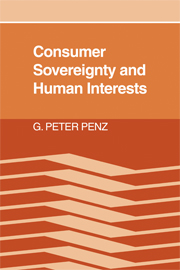Book contents
7 - The comparability problem of the want-satisfaction principle
Published online by Cambridge University Press: 25 October 2011
Summary
The want-satisfaction principle and calculus requirements
Although the focus of this book is the constitutive principle of consumer sovereignty and alternatives to it, calculus questions that have therefore been largely omitted so far cannot be ignored altogether. If a constitutive principle is not measurable in some way, then no matter how attractive it is conceptually, it is useless for the optimization and evaluation of economic policies, institutions, and systems. Thus the measurability of want satisfaction has to be considered to determine the attractiveness of want satisfaction as a constitutive principle. This is an issue parts of which economists have explored in great depth. The treatment here will, therefore, be merely in the nature of a brief review of some important positions concerning the measurability of want satisfaction. The point of the discussion in this chapter will be to reveal the limits to the measurability of want satisfaction that arise from the subjectivity of want satisfaction as a constitutive principle.
There are various approaches to measurement. Some measures capture directly the magnitude of what is to be ascertained, whereas others are more in the nature of proxy measures that indicate the magnitude of certain symptoms, correlates, or causes of the variable that is of concern. Moreover, some measures are cardinal, whereas others are merely ordinal. Thus whether a variable is measurable or not is not usually a question that can be given an unqualified yes-or-no answer.
- Type
- Chapter
- Information
- Consumer Sovereignty and Human Interests , pp. 123 - 136Publisher: Cambridge University PressPrint publication year: 1986



